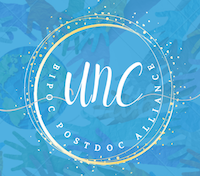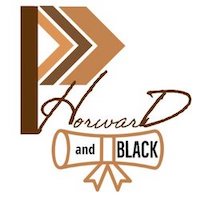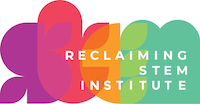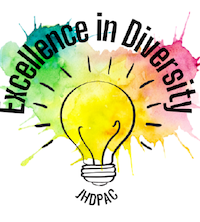Natalie Ringdahl and Alberto I. Roca, Ph.D.
Postdocs and doctoral graduate students from across the nation convened in southern California with a clear mission: to create supportive counterspaces for minority postdocs and to ensure the sustainability of these communities on a national scale. The Fall 2023 DiverseScholar Conference (#DivSch23) attracted postdoc leaders representing various diversity associations at higher education institutions (see Stakeholders Affinity Groups roster). By each leader sharing their respective associations’ objectives, achievements, and challenges, this knowledge sharing can help support each other’s community. The combined impact of this peer-to-peer network can contribute toward diversifying the STEM workforce especially in higher education.
North Carolina
 Dr. Jasmine Edwards, a University of North Carolina at Chapel Hill (UNC) Postdoc, introduced the UNC BIPOC Postdoc Alliance and the PhorwarD and Black non-profit organization. The Black, Indigenous, and People of Color (BIPOC) postdocs like Edwards, strive to create a safe and supportive space for their small population at UNC. For example, Dr. Edwards explained that their “UNC Science Expo Day” supports science outreach, networking, and socializing among peers.
Dr. Jasmine Edwards, a University of North Carolina at Chapel Hill (UNC) Postdoc, introduced the UNC BIPOC Postdoc Alliance and the PhorwarD and Black non-profit organization. The Black, Indigenous, and People of Color (BIPOC) postdocs like Edwards, strive to create a safe and supportive space for their small population at UNC. For example, Dr. Edwards explained that their “UNC Science Expo Day” supports science outreach, networking, and socializing among peers.
“We introduced the general public, kids, adults, [and] teens to the science behind why everyone’s skin tones are so different … [through] a matching game in which I printed out this world map of indigenous skin tones,” Edwards said.
 Edwards explained how these diversity organizations have created an open bridge of communication between the faculty, postdocs, and general community at UNC. Additionally, the diversity efforts of the PhorwarD and Black organization similarly engage with science outreach events tailored specifically to disadvantaged communities in the Research Triangle Park area. This past July, PhorwarD and Black hosted their first symposium accompanied by leadership workshops and distinguished guest speakers. In the future, they hope to host more events, spur more participation, and attract the resources needed for BIPOC postdocs and their careers.
Edwards explained how these diversity organizations have created an open bridge of communication between the faculty, postdocs, and general community at UNC. Additionally, the diversity efforts of the PhorwarD and Black organization similarly engage with science outreach events tailored specifically to disadvantaged communities in the Research Triangle Park area. This past July, PhorwarD and Black hosted their first symposium accompanied by leadership workshops and distinguished guest speakers. In the future, they hope to host more events, spur more participation, and attract the resources needed for BIPOC postdocs and their careers.
Washington state
Dr. Ariana Gomez represented the Postdoc Diversity Alliance of the University of Washington. The Alliance brings together those who identify from marginalized backgrounds into a vibrant community of minority postdocs, the Alliance’s social events fostered genuine connections among members. Alliance off-campus activities attracted BIPOC graduate students and postdocs for networking and fellowship while supporting local Black and Latina owned businesses.
Science communication and policy
 Dr. Evelyn Valdez-Ward described how her experiences with immigration reform work led her to become the Executive Director of the Reclaiming STEM Institute while maintaining her duties as a University of Rhode Island postdoc. She reflected on the difficulties of balancing advocacy efforts, policy training, and lobbying engagements while she was an undocumented graduate student at the time of the initiative’s founding in 2018.
Dr. Evelyn Valdez-Ward described how her experiences with immigration reform work led her to become the Executive Director of the Reclaiming STEM Institute while maintaining her duties as a University of Rhode Island postdoc. She reflected on the difficulties of balancing advocacy efforts, policy training, and lobbying engagements while she was an undocumented graduate student at the time of the initiative’s founding in 2018.
“It’s kind of hard...I felt like I had to fight for my right to stay in the country and continue my science,” Valdez-Ward said.
Recognizing the need for justice-focused scientific leadership and resources for marginalized scientists, Valdez-Ward and her co-founder Dr. Linh Anh Cat, decided to host the first of multiple diversity workshops. Valdez-Ward and Kat cultivated an informative and collaborative environment in their workshops where attendees learned how to navigate STEM careers in science communication and science policy.
Valdez-Ward highlights specific issues that her Reclaiming STEM Institute aims to find solutions to: “How do we identify what postdocs really need, especially [those] from marginalized backgrounds? How do we change training spaces so that we can actually make healthy spaces where postdocs will thrive and continue on in academia? Because we're losing a lot of us [specifically] in that intersection into academia.” Valdez-Ward's poignant questions shed light on the pressing challenges faced by postdocs, emphasizing the urgent need for comprehensive solutions.
Stanford University
 Dr. Jordan Moore of Stanford University presented about the Stanford Black Postdoc Association. While acknowledging the efforts of the Stanford Office of Postdoctoral Affairs (OPA) for supporting all postdocs on campus, Moore raised an interesting point about the need for more targeted support: “We’re all under OPA, which covers all postdocs, but how do we do something for ourselves?” This question delves into the nuances of creating communities within community.
Dr. Jordan Moore of Stanford University presented about the Stanford Black Postdoc Association. While acknowledging the efforts of the Stanford Office of Postdoctoral Affairs (OPA) for supporting all postdocs on campus, Moore raised an interesting point about the need for more targeted support: “We’re all under OPA, which covers all postdocs, but how do we do something for ourselves?” This question delves into the nuances of creating communities within community.
Moore’s concerns about focused support systems prompted an important discussion about inclusivity and representation within affinity groups. In addressing the diverse needs of postdocs at Stanford, Moore posed the crucial question, “How do we find something for everybody?” By integrating industry, entrepreneurship, and identity into their initiatives, Moore hopes to deepen and diversify the experiences of Stanford postdocs while promoting the idea of embracing one’s authentic self, even in intimidating and uncomfortable environments.
Johns Hopkins University
 Dr. Amilcar Perez of Johns Hopkins University (JHU) represented the Diversity Postdoctoral Alliance Committee (DPAC). As the organization’s co-chair, Perez described his role in organizing the seventh annual Excellence in Diversity conference aimed at providing a platform for underrepresented minorities from historically excluded backgrounds to showcase their research. Thanks to generous funding from the JHU Office of Diversity, Equity and Inclusion and the Johns Hopkins Postdoctoral Association, Perez and his team successfully attracted student presenters from various academic levels, including high school, undergraduate, graduate, and postdoc scholars.
Dr. Amilcar Perez of Johns Hopkins University (JHU) represented the Diversity Postdoctoral Alliance Committee (DPAC). As the organization’s co-chair, Perez described his role in organizing the seventh annual Excellence in Diversity conference aimed at providing a platform for underrepresented minorities from historically excluded backgrounds to showcase their research. Thanks to generous funding from the JHU Office of Diversity, Equity and Inclusion and the Johns Hopkins Postdoctoral Association, Perez and his team successfully attracted student presenters from various academic levels, including high school, undergraduate, graduate, and postdoc scholars.
Perez highlighted the event’s inclusion of students from three local Historically Black Colleges and Universities (HBCU). “We were able to have three different HBCUs represented at this conference, where normally they may not have [had] the opportunity to present their research at a research institution [like JHU],” said Perez.
In addition to conference initiatives, Perez highlights DPAC’s collaboration with Professor Janielle Mayard in leading a specialized mentoring program at Johns Hopkins University.
This initiative pairs JHU graduate students or postdocs with HBCU students offering invaluable laboratory and research experiences. Perez emphasizes the importance of fostering meaningful connections and introducing students to the world of scientific research.
Concluding his remarks, Perez discussed the unique opportunities afforded to DPAC leadership, including monthly meetings with the Office of Diversity, Equity and Inclusion, and participation in executive administrator meetings. These engagements played a pivotal role in shaping JHU leadership such as the hiring of the Dean for Diversity, Equity and Inclusion for the office of Graduate Medical Education and Postdoctoral Affairs.
Latina Postdoc Collective
The last group of DivSch23 roundtable speakers were the new Latina Postdoc Collective. Dr. Katherine Garcia of the University of California, Irvine recounts how she and her three other Latina postdoc colleagues met at the 2022 annual conference of the Association for the Study of Higher Education. Their shared passion about STEM education research sparked their mutual vision: to carve out a nurturing Latinx community tailored to postdocs with similar research backgrounds.
Dr. Janeth Martinez-Cortes of the University of Texas at San Antonio described how they began as an online group. She underscored the critical need for additional support, explaining how incorporating resources for job applications, conferences, and writing projects into their weekly meetings proved essential for creating a space for personal and professional development.
nurturing a Latinx community tailored to postdocs
Dr. Jessica Rivera of the University of Texas at El Paso (UTEP) shared her journey navigating Hispanic Serving Institutions. Earlier in her career, she transferred from The Ohio State University to her current institution. At UTEP, Rivera observed a significant lack of career resources available to her fellow postdocs. Undeterred by these challenges, Rivera's quest to nurture a local support community reflects her tenacious spirit.
“Here I am again in this space where there’s no space for me,” said Rivera. However, her resilience and determination transcended institutional limitations and paved the way for a peer postdoc community that champions inclusivity and support.
Together, Garcia, Martinez-Cortes, and Rivera empower other postdocs, especially those who feel there is no space where they can belong, to find peer supporters who are invested in their success.
Postdoctoral diversity counterspaces
After the postdocs shared their insights and personal journeys navigating the complex landscape and challenges of being "minoritized" in academic spaces, DivSch23 conference organizer Dr. Alberto Roca reflected on the discussion. A prominent topic was the intersection of multiple cultures and ethnicities within peer support communities. Despite facing unique challenges within their activities, postdocs faced similar goals — they collectively struggle to be recognized, supported, and accepted as people of color. As one attendee aptly put it, postdocs should embrace their differences, “bringing us together as a group to bring awareness to the issues that we broadly face.” Ultimately, events like the 2023 DiverseScholar Conference aim to bolster the movement to preserve individual diversity and create strength through unity.

From top to bottom are the logos of the following organizations: the University of North Carolina at Chapel Hill BIPOC Postdoc Alliance, PhorwarD and Black, the ReclaimingSTEM Institute, the Stanford Black Postdoc Association, and the Johns Hopkins University Diversity Postdoctoral Alliance (Image credit is each respective group). The last image is a group photo of attendees of the 2023 DiverseScholar Conference (Credit: A. Roca).
N. Ringdahl & A.I. Roca (2024) DiverseScholar Conference Supports Diversity Postdoc Communities. DiverseScholar 15:1
Natalie Ringdahl is a freelance writer and an undergraduate student double-majoring in Political Science and Philosophy with a specialization in Law and Society at the University of California, Irvine. Alberto I. Roca, Ph.D. is the Founder and Editor of MinorityPostdoc.org. Any opinions expressed in this article are solely those of the authors.
DiverseScholar gratefully acknowledges Burroughs Wellcome Fund grant (#G-1023278) that supported the #DivSch23 Conference.
DiverseScholar is now publishing original written works. Submit article ideas by contacting us at info@DiverseScholar.org.
Published 18-Jul-2024
